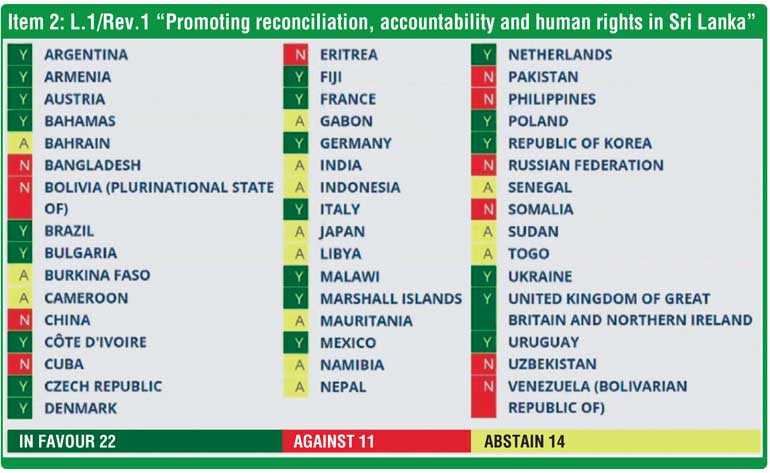Sunday Feb 15, 2026
Sunday Feb 15, 2026
Saturday, 1 May 2021 00:28 - - {{hitsCtrl.values.hits}}

The yardstick that reveals this trend is the number of votes the Government was able to muster over a resolution during the human rights sessions in Geneva. Only 11 of the 47 members of the United Nations Human Rights Council were convinced by Sri Lanka’s case and voted for it this year
 It should be clear to anyone who followed the headlines from Sri Lanka in March that the country has continued its downward spiral on the stage of global affairs.
It should be clear to anyone who followed the headlines from Sri Lanka in March that the country has continued its downward spiral on the stage of global affairs.
The yardstick that reveals this trend is the number of votes the Government was able to muster over a resolution during the human rights sessions in Geneva. Only 11 of the 47 members of the United Nations Human Rights Council were convinced by Sri Lanka’s case and voted for it this year.
This is quite a diplomatic fall from grace, and it raises questions if the country can sink even lower at the HRC. To understand Sri Lanka’s predicament, one has to look back over a decade, to 2009, the year the nearly 30-year ethnic conflict came to a bloody end. That year, against heavy diplomatic odds, Sri Lanka convinced 29 countries to back its case.
But that high watermark, as we now know, was to be short-lived, as resolutions in the subsequent years revealed. In 2012, the international support fell by half, to 15 votes. By 2013 only 13 countries stood by Sri Lanka – suggesting that there was a drift away from other nations backing the Sri Lankan cause. By 2014, as the then President Mahinda Rajapaksa was rounding off his second term, international support at the HRC dropped to 12.
This scorecard of Sri Lanka in Geneva is open to many interpretations. For me, as a journalist, it has been helpful to gauge the trajectory of Sri Lanka’s post-war history and how that is perceived internationally. It has also served as an entry point to understand what the national mood is on the human rights front, and where the political class sits on issues such as justice and reconciliation. This has been reflected with ample fervour in the debates across the Lankan media in the periods surrounding human rights session. At this moment, given ideology of the government of the day, the ultra-nationalist sentiments prevail.
But if you were to step back from the noise, you will be able to detect elements of a political ritual taking shape. One can even break it down to the pre-Geneva season and the post-Geneva season. Colourful expressions have surfaced over time to give the Geneva discussions a unique vocabulary. Some of them have been drawn from local situations and some from the world of literature. One well-known Sri Lankan media personality kept referring to the recent Geneva sessions in months leading to it as “the Ides of March”. There was an obvious sense of foreboding with each of his deliveries.
The sentiments among the ordinary people are, at times, equal to the task. They have enrichened the discussion with their colourful takes. That is how I picked up this particular expression about the HRC: “It is like the Sword of Damocles hanging over the Sri Lankan State.”
Some of these thoughts were shared during conversations I had had in Colombo ahead of a story I wrote late last year about Geneva 2021. And the impression I came away with after one such meeting was that the annual human rights sessions have evolved to become a new constant in Sri Lanka’s contemporary political life, and it may easily qualify in second place, after the national elections, as a useful barometer to measure the Lankan political winds.
But let me expand on that point, because the Geneva sessions have another dimension that is as relevant for those of us who follow Sri Lanka’s political twists. They provide guidance to track where the country stands in its commitments to deliver on the rule of law, justice and democratic rights, which is the theme of today’s webinar.
For observers of Lankan affairs, the text that emerged out of Geneva has opened up new story lines to consider. One that should keep journalists busy is the language for an accountability process to achieving post-war justice. The relevant section says that this new international effort will be mobilised to “collect, analyse, and preserve evidence” of gross human rights violations and international crimes committed in Sri Lanka to be used for future prosecutions.
For observers of Lankan affairs, the text that emerged out of Geneva has opened up new story lines to consider. One that should keep journalists busy is the language for an accountability process to achieving post-war justice. The relevant section says that this new international effort will be mobilised to “collect, analyse, and preserve evidence” of gross human rights violations and international crimes committed in Sri Lanka to be used for future prosecutions. That should make uncomfortable reading for those who were involved in war crimes or human rights atrocities. But the more headline-grabbing accounts are likely to emerge from other passages of the Geneva text. It is the section that encourages countries to consider hearing cases against Sri Lanka’s alleged war criminals in their respective courts. These provisions have pushed Sri Lanka to join the ranks of nations with brutal legacies of political oppression and ethnic conflicts in Latin America, Africa and Asia
That should make uncomfortable reading for those who were involved in war crimes or human rights atrocities. Some of the names implicated in such abuses are already in the public domain. It is very likely that now, with an evidence-gathering mechanism taking shape, more names will be added. So bit by bit, what had appeared not possible in Sri Lanka, because governments have been unwilling to, or the country’s justice process has been unable to, as human rights experts say, is taking shape in foreign climes.
But the more headline-grabbing accounts are likely to emerge from other passages of the Geneva text. It is the section that encourages countries to consider hearing cases against Sri Lanka’s alleged war criminals in their respective courts. These provisions have pushed Sri Lanka to join the ranks of nations with brutal legacies of political oppression and ethnic conflicts in Latin America, Africa and Asia.
And it may be worth recalling that some of the governments from those countries have had to muster their diplomatic capital to deal with their own citizens, who were accused of war crimes, being targeted by human rights activists and lawyers. The latter wanted the former to be tried in foreign courts under the principle of universal jurisdiction. In light of Sri Lanka’s dismal voting record in March, this is surely going to be another test of the country’s diplomatic reach.
Such a turn in Sri Lanka’s human rights narrative comes down to this for those who committed war crimes: henceforth, they may have to give serious thought to which foreign country they plan to travel to next time. It will not be business as usual anymore. There is a growing list of examples that help to illustrate cases of serial human rights violators who were in foreign countries as a free man – yes, the perpetrators are all men – being arrested for war crimes or grave human rights violations.
The ruthless and manipulative Indonesian dictator Suharto’s name comes to mind among the early examples in this context. He was on such a wanted list for his oppressive record during his autocratic rule of 32 years. The terror he unleashed resulted in massacres of up to 500,000 citizens, yes, half-a-million people, according to conservative estimates. But after he lost power in 1998, and his health weakened, the former strongman of Southeast Asia feared travelling to European countries for medical care. The reason, according to human rights groups, was that he dreaded being arrested in a foreign city. So, yes, he stayed home and avoided becoming an international story.
But the one who did create a media storm, and someone who is worth recalling in light of the theme I have chosen to focus on today, is the imperious and arrogant Augusto Pinochet. For those unfamiliar with the name, he was the former dictator of Chile. He was arrested in London after a British court accepted a case against him by a Spanish jurist.
The moment was celebrated by human rights campaigners for the precedent that the British courts had set: ending the concept of sovereign immunity that had given war criminals and tyrants the freedom to travel without fear of arrest. It marked the arrival of universal jurisdiction as another means by which to go after the world’s worst rights violators. And the world got the “Pinochet Precedent” as a result.
In fact, it was only a few years later that I first came across the name of Ricardo Miguel Cavallo. I was working in Mexico at the time and had been assigned to cover human rights. The beat included stories of the men who had been involved in the former oppressive regimes of Latin America. Some of them had fled to Mexico, like Cavallo, and others had got to other “safe” countries.
Cavallo had been a military officer in Argentina before that, when it was ruled by a junta, during the years of its “Dirty War”. He had arrived in Mexico later and had remained under the radar for years as a free man, working in Mexico’s national registry of motor vehicles. But then his cover-up ended. He was arrested in the Caribbean coastal resort of Cancun. The “Pinochet Precedent” had finally caught up to him. Yes, he was indicted under that principle, affirming that the idea of universal jurisdiction was spreading across countries.
The previous speaker just reminded us where the quest for universal justice has progressed since then. The Magnitsky Act that is evolving into a Magnitstky movement now has 31 countries that have signed on and changed their laws, he said. This enables those countries to target the bank accounts and financial dealings – even credit cards – of human rights offenders.
Stories about such offenders make for compelling reading. They will continue to be told because they help to advance the cause of justice and accountability. The likelihood of Sri Lankan names joining that list has increased after the Government’s diplomatic debacle in Geneva. And if that was to happen, those of us who are observers and reporters of the country’s political life will have new areas of inquiry to pursue.
(Marwaan Macan-Markar is an Asia regional correspondent for Nikkei Asia, a Tokyo-based publication. He covers mainland Southeast Asia and lower South Asia and divides his time between Thailand and Sri Lanka. He was the former Features Editor of The Sunday Leader, a Sri Lankan weekly that has ceased publication. This article features the address delivered by Macan-Markar during a recent webinar on ‘Rule of Law, Justice and Democratic Rights in Sri Lanka,’ organised by the Sydney-based LAWASIA – www.lawasia.asn.au/.)